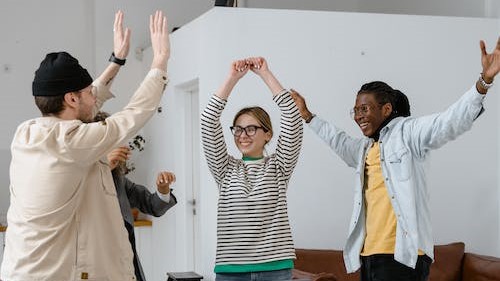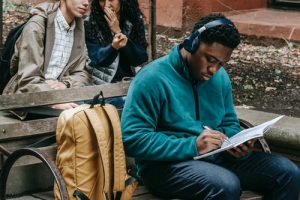
From Awareness To Acceptance—It’s An Important Step
You may remember last year, during Autism Awareness Week, I wrote about our community crying out for change (find the post here). I explained that there is an awareness of autism but there remains an ignorance about what it actually is and how it impacts people; we feel we have a long way to go. The autistic community felt acceptance would be a more helpful word.
I’m incredibly excited to say, the people with power have listened to us! The National Autistic Society have changed Awareness to Acceptance, so this year we have:
World Autism Acceptance Week
This is hugely important—the autistic community feel heard! This is ground-breaking—we’re going to stand out! We have a chance to make a real difference!
What are we asking for?
Accept the diagnosis
For some, it may feel as though a diagnosis has come out of the blue; while for others, it may feel as though it’s been a long time coming! Whether the individual is self diagnosed or professionally diagnosed is irrelevant, accepting the word means so much. Autism cannot be separated from an individual; it is part of them, just as being short/tall, male/female/non-binary, easy going, out going. Accepting an individual as autistic is accepting part of their core being.
Accept us as we are
Autism is something different for each of us.
“When you’ve met one autistic person, you’ve met one autistic person”
Maybe we pass as neurotypical, maybe we stand out as eccentric, maybe we like to make friends 1-1, maybe we like to keep quiet about our autism, maybe we’re loud and proud. Living in a world designed by and for neurotypicals is tough, we’re doing our best to navigate a road littered with obstacles; it’s for no one else to tell us how to live with our autism. Please try to accept us just as we are.
Accept differences

Fitting in and belonging is a huge part of cultural identity. Being neurodivergent can sometimes mean feeling like an alien. Trying to fit in can mean masking and risking mental ill-health. Unmasking can feel risky too but being in a truly inclusive environment is life-changing. At work, socialising or generally out and about, would you accept individuals engaging in the following behaviours?
- Wearing headphones
- Engaging in self stimulatory behaviour (stimming e.g. flapping their hands or rocking)
- Echolalia (repeating previously heard sounds or words)
- Wearing sunglasses
- Not keeping eye contact when speaking to you
- Engaging with sensory objects (stim toys)
- Exiting a situation quickly without explanation
Reading this list you may think “these are not socially acceptable”. But to truly accept autistic individuals into society including work spaces, these things (and others) need to become socially acceptable. I do not engage in all these behaviours but I socialise with people who do—sometimes I’m distracted by what they do/say but if these things help them to concentrate or to be able to access the world, I’m happy to accept them.
Accept change
When someone receives a diagnosis or realises they’re neurodivergent, you may see them change. The pull to fit in means they’ve most likely been masking most of their life. When correctly diagnosed the relief that unmasking brings is huge! Becoming our authentic selves is life saving. It’s an incredibly sad truth that many autistic people lose friends due to their autism. I’ve been fortunate that some people have encouraged my authentic autistic self to flourish.
Accept our strengths
What do you think of the following?
- “It’s great, every day is different!”
- “You should try something new once in a while”
- “You need to get out of that rut”
- “You need to be more spontaneous”
You’d never hear someone say “it’s great to do the same thing every day” or “this rut is nice and comfy” without adding some sarcasm. For many autistic individuals, ritual, routine and resistance to change are part of the condition. We’re not being stubborn or deliberately difficult, it’s woven into how our brains work. Yet, we are called boring or unambitious, nit-picky or up-tight. The neurotypical world struggles to see the benefit of someone who likes repetitive tasks, someone who strives for perfection in sameness—but fully embracing the autistic mind instead of seeing it as a problem leads to seeing the real strengths we have, for example:
- Intense focus
- Attention to detail
- Considered and reflective approach
- Honesty and integrity
- Creative thinking
Accept we need to reject stereotypes!
This is the one place where awareness is still needed. While people are awareness of autism, their awareness comes from media’s inaccurate portrayal; generally based on the typically male presentation, they use neurotypical actors to entertain a neurotypical audience. May I direct you towards a Prime Video series As We See It; autistic actors portraying a range of experiences—it’s received mixed reviews from the autistic community but it’s hard to please everyone! This may help you understand that we’re not all Rainman but some of us hold down jobs, have partners and have a range of support needs.
Radical acceptance
I’ve touched on a few ways we can fully embrace and accept autism and autistic individuals but we have a long way to go. I don’t use the word radical, lightly. I use it to mean that when we think we’re doing enough, we need to take another step. It’s not just about being aware that autism is out there, it’s about realising that we can all do our bit to make society more inclusive, more accessible and more accepting of anyone who feels different. It’s not about saying “we’re all unique”, it’s about really listening to those who’ve been excluded for far too long and making sure we provide for their needs.
What can we all do to help?

- Like, share or comment on this blog/post to help it reach more people (a huge thank you to those who have done this before)
- Download or share something from this year’s National Autistic Society – World Autism Acceptance Week material
- Look at other ways you can help the Nation Autistic Society
- Ask questions and keep the conversation going—WAAW maybe just one week but we’re autistic for our whole lives. Be a voice and stand up for the changes that are needed, at work and in any social groups you belong to.





Comments
I need to to thank you for this great read!! I absolutely loved every bit of it. I have got you bookmarked to check out new stuff you postÖ